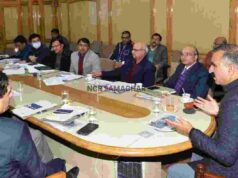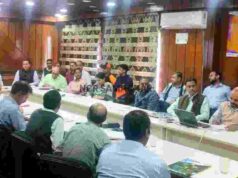To fall into line with the comprehensive National Action Plan on Climate Change (NAPCC), one-day orientation workshop for legislators, administrative secretaries and heads of departments on climate change- ‘Need for adaptation in HP’ was held at Hotel Peterhoff here today. The workshop was organized jointly by Vidhan Sabha and Department of Environment, Science and Technology.
Chief Minister Shri Virbhadra Singh while addressing said that the main aim of this workshop was to sensitize and educate people on the likely impact of climate change and stressed upon formulating policies, which in the long run can be oriented to strengthen adaptive capacity of the people.
India is facing a challenge of sustaining its rapid economic growth while dealing with threat of climate change globally, said the Chief Minister adding that a comprehensive strategy was required along-with adaptation to the climate change besides enhancing the ecological sustainability.
Apart from floods and disasters, we are witnessing every day in the country. Himachal is no exception to it. Massive landslides, cloudbursts and melting of glaciers were signaling the change in the climatic conditions and were taking heavy toll on life and property, said Shri Virbhadra Singh.
‘Our approach should be compatible with our role as responsible and awakened citizen ready to contribute to meet or rather to find a solution of global challenge on climatic change’, he said.
Shri Virbhadra Singh said that as Himachal was agricultural dominated State, we need to focus more on conservation of forest wealth, promoting and understanding climate change and adopting energy efficiency techniques to maintain agro-economy from being derailed.
He said that in 1950 merely 792 hectare area was under horticulture which as of now had increased to 2.23 lakh hectare and the fruit production had increased from 1200 tonne in 1950 to seven lakh tonne today. To save the agriculture and horticulture from the devastating effects of climate change we need to formulate a comprehensive policy and educate the people, he said. If the global warming keeps such a pace the agriculture production in the country can go down to 4 percent by 2030.
The Chief Minister said that we need to restrict the green house emissions and work for earning carbon credits adding that we need to devise appropriate technologies for both adaptation and mitigation of green house gases emissions extensively and at an accelerated pace as per the principles of NAPCC.
It is Himachal that caters to waterand power needs of maximum other northern regions of the country and any adverse impact of climate change will not only affect the state but the people of northern region as well, said the Chief Minister.
The presentation on climate change and of Himalayan glaciers were also given on the occasion. Ms. Sabine, the country head of German Climate Change Programme presented a greater view on climate change besides, Dr. Kirtimaan and Dr. Mustafa Ali Khan with a team of Swiss experts also gave their presentation on Indian Himalayan adaptation programme.
Experts including Prof. Anil Kulkarni from Institute of Sciences, Banglore and Prof. S.P. Singh Chairman, Central Himalayan Environment Association gave their valuable inputs on climate change. Prof. Anil Kulkarni is doing research study on Himalayan glaciers from last 35 years and briefed about the receding glaciers in Himalayan region due to global warming.
Speaker B.B.L. Butail also stressed upon to establish effective, cooperative and equitable global approach based on principles of common responsibilities and capabilities.
Earlier, Additional Chief Secretary, Environment, Science and Technology Shri Tarun Kapoor welcomed the Chief Minister and dignitaries on the occasion and also briefed about the motive of holding such workshops which were likely aimed at adaptability of people to climate change.
He said that the state centre on climate change of HP council for science and technology & Environment (HIMCOSTE) had been carrying different studies in himachal Himalaya since 1993 .
Ministers, MLAs, Chief Secretary Shri V.C. Pharka, administrative secretaries, heads of departments, and other senior officers were also present in the workshop.








